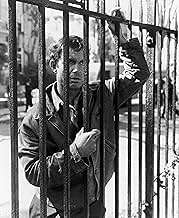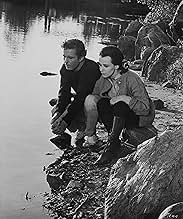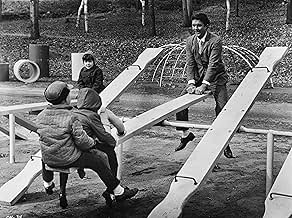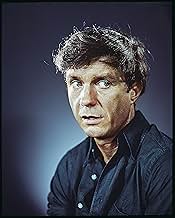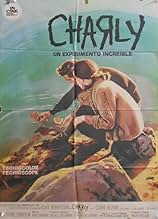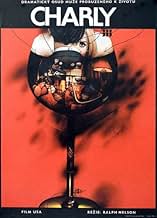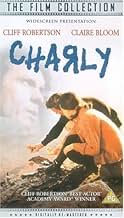AVALIAÇÃO DA IMDb
6,9/10
7,6 mil
SUA AVALIAÇÃO
Um homem com uma deficiência intelectual passa por uma experiência que lhe dá a inteligência de um gênio.Um homem com uma deficiência intelectual passa por uma experiência que lhe dá a inteligência de um gênio.Um homem com uma deficiência intelectual passa por uma experiência que lhe dá a inteligência de um gênio.
- Direção
- Roteiristas
- Artistas
- Ganhou 1 Oscar
- 4 vitórias e 6 indicações no total
Dick Van Patten
- Bert
- (as Richard Van Patten)
Edward McNally
- Gimpy
- (as Skipper McNally)
Marianna Case
- Young Woman
- (não creditado)
Leon Collins
- Tap Dancer
- (não creditado)
Harry Cooper
- Conference Attendee
- (não creditado)
Frank Dolan
- Eddie
- (não creditado)
Randee Lynne Jensen
- Extra
- (não creditado)
Ralph Nelson
- Convention Speaker
- (não creditado)
Donald Warnock
- Conference Attendee
- (não creditado)
- Direção
- Roteiristas
- Elenco e equipe completos
- Produção, bilheteria e muito mais no IMDbPro
Avaliações em destaque
Before there was "Awakenings" (1990) and "Good Will Hunting" (1997), there was a sincere, sad, and bittersweet film called "Charly" (1968). The film is based on the book "The Two Worlds of Charly Gordon." Cliff Robertson delivers a brilliant performance as a mentally retarded man who becomes a genius through scientific experiments. Claire Bloom is Charly's social worker (and love interest). The film is directed by Ralph Nelson ("Lillies of the Field"). score: 8 (out of 10).
A mildly mentally retarded man submits to a scientific experiment to increase his intelligence. Like "Frankenstein", "Charly" is a clever morality play about science that crosses certain boundaries. Unlike "Frankenstein", which took the horror route, "Charly" explores the emotional human tragedy that inevitably occurs when an experiment of this nature goes awry.
Many scientists back then and even today argue that the professional boundaries that were crossed in this story would never happen in real life. Yet with the recent successful gene manipulation and cloning experiments many believe it is only a matter of time, a very short time, before a human submits to such experiments.
The movie, of course, is not this clinical. Based on the classic novel, "Flowers for Algernon", the movie strikes a keen balance of warmth, comedy and tragedy. Cliff Robertson's fascinating portrayal of the main character is unforgettable. His delivery of the powerful speech at the scientific convention is just as stunning and eerily accurate today as it was over thirty years ago.
An emotional, touching drama, "Charley" still rings a cautionary bell. One that should be heard and not ignored as we enter the new millennium.
Many scientists back then and even today argue that the professional boundaries that were crossed in this story would never happen in real life. Yet with the recent successful gene manipulation and cloning experiments many believe it is only a matter of time, a very short time, before a human submits to such experiments.
The movie, of course, is not this clinical. Based on the classic novel, "Flowers for Algernon", the movie strikes a keen balance of warmth, comedy and tragedy. Cliff Robertson's fascinating portrayal of the main character is unforgettable. His delivery of the powerful speech at the scientific convention is just as stunning and eerily accurate today as it was over thirty years ago.
An emotional, touching drama, "Charley" still rings a cautionary bell. One that should be heard and not ignored as we enter the new millennium.
A mentally challenged man named Charly (Cliff Robertson) desires to become smarter so that he wouldn't always be picked on by his so-called friends at his workplace. However, he has made no progress despite his efforts of going to school. One day he gets a chance to undergo some experimental brain surgery and his intelligence skyrockets, making him a genius. Still, he cannot stop feeling like an outsider or find happiness with Alice, the woman he loves (Claire Bloom).
The director uses many split screens and other alienating techniques to portray the fragile mental state of Charly; at points they get rather annoying and look dated. The montage near the end, depicting the progression of Charly and Alice's relationship, comes across as rather hasty, considering the scene directly preceding it. Mostly the story advances fine though, and the pondering about the surgery's effects on Charly's psyche is interesting – there should have been more of it, actually. Robertson's Oscar-winning performance in the lead role is decent, although I preferred his calm 'intelligent Charly' to his naïve 'challenged Charly'.
The director uses many split screens and other alienating techniques to portray the fragile mental state of Charly; at points they get rather annoying and look dated. The montage near the end, depicting the progression of Charly and Alice's relationship, comes across as rather hasty, considering the scene directly preceding it. Mostly the story advances fine though, and the pondering about the surgery's effects on Charly's psyche is interesting – there should have been more of it, actually. Robertson's Oscar-winning performance in the lead role is decent, although I preferred his calm 'intelligent Charly' to his naïve 'challenged Charly'.
Charly is a very touching sci-fi film about a retarded man Charly Gordon (Cliff Robertson) who can barely perform the menial job of sweeping up in a bakery and is the continual butt of jokes and ridicule by the bakers. He is chosen to participate in an experiment and is given treatments to boost his IQ. Alice Kinninan (Claire Bloom) plays one of the scientists who helps Charly to learn. Charly is based on the story Flowers For Algernon and the screenplay was by Stirling Silliphant (In The Heat of the Night.) Cliff Robertson won a best actor Oscar for Charly. The film is intelligent, poignant, and extremely moving. You'll need a box a Kleenex with your popcorn for this one.
After having done The Days Of Wine And Roses On the small screen and seeing Jack Lemmon get the part for the big screen, Cliff Robertson pulled a Katharine Hepburn. Like Kate the great who bought the screen rights to The Philadelphia Story and dictated the making of it to MGM, Robertson did the same for Charly which he had done on the US Steel Hour almost a decade earlier on television. He did better than Lemmon who only was nominated for Best Actor for Days Of Wine And Roses.
Charly is the story of an amiable mildly retarded man who works and supports himself in a job at a bakery, but also has agreed to become an experimental subject to scientists, Claire Bloom, Leon Janney, and Lilia Skala. Janney has a theory in which he feels that the proper enzyme given and an operation and Robertson could start to function like a normal person.
The operation has some foreseen and unforeseen consequences. One of them is that Robertson is one fully functioning male, but still lacks a whole lot of social skills. He forms an attachment to Bloom which is something she saw coming, but not necessarily her.
More important he becomes far more aware of the world around him and how badly treated he was by a lot of people. One role I very much liked was that of his landlady Ruth White who was a woman with a big heart who does value Robertson as a person and gives him the respect any of us is due.
Still the film belongs to Cliff Robertson who won an Oscar for Best Actor in 1968. Robertson had some stiff competition that year, but probably was helped by the fact that three of his competitors were British, Alan Bates for The Fixer, Ron Moody for Oliver, and Peter O'Toole for The Lion In Winter who if memory serves was the betting favorite. The other nominee was Alan Arkin for The Heart Is The Lonely Hunter. How he manages to go from a mildly retarded man to a person of no mean erudition is a wonderful process unfolding on the screen. Personally I think it ought to be required viewing in every acting class on the globe, the subtleties are something to behold.
I don't claim to be any kind of scientific expert on this or any other scientific matter, but I would love to hear from those who know more as to whether the whole theory is feasible or not. In any event though Charly is a fine picture with both a message and a heart.
Charly is the story of an amiable mildly retarded man who works and supports himself in a job at a bakery, but also has agreed to become an experimental subject to scientists, Claire Bloom, Leon Janney, and Lilia Skala. Janney has a theory in which he feels that the proper enzyme given and an operation and Robertson could start to function like a normal person.
The operation has some foreseen and unforeseen consequences. One of them is that Robertson is one fully functioning male, but still lacks a whole lot of social skills. He forms an attachment to Bloom which is something she saw coming, but not necessarily her.
More important he becomes far more aware of the world around him and how badly treated he was by a lot of people. One role I very much liked was that of his landlady Ruth White who was a woman with a big heart who does value Robertson as a person and gives him the respect any of us is due.
Still the film belongs to Cliff Robertson who won an Oscar for Best Actor in 1968. Robertson had some stiff competition that year, but probably was helped by the fact that three of his competitors were British, Alan Bates for The Fixer, Ron Moody for Oliver, and Peter O'Toole for The Lion In Winter who if memory serves was the betting favorite. The other nominee was Alan Arkin for The Heart Is The Lonely Hunter. How he manages to go from a mildly retarded man to a person of no mean erudition is a wonderful process unfolding on the screen. Personally I think it ought to be required viewing in every acting class on the globe, the subtleties are something to behold.
I don't claim to be any kind of scientific expert on this or any other scientific matter, but I would love to hear from those who know more as to whether the whole theory is feasible or not. In any event though Charly is a fine picture with both a message and a heart.
Você sabia?
- CuriosidadesAfter the operation, when Charly loses his temper over being beaten once again by the mouse, no one seems to notice that he is now pronouncing Algernon's name with the first N included, instead of his previous "Algeron" with the missing N.
- Erros de gravaçãoWhen Charly is talking to Mrs. Kinnian outside the building for his night class, he's wearing a gold vest. When the camera cuts back to him after Mrs. Kinnian enters her car, he's wearing a blue vest.
- Citações
Charly Gordon: I was wondering why the people who would never dream of laughing at a blind or a crippled man would laugh at a moron?
- Cenas durante ou pós-créditosThe title appears onscreen as if scrawled by a child, with the "R" backwards.
- ConexõesFeatured in The 70th Annual Academy Awards (1998)
Principais escolhas
Faça login para avaliar e ver a lista de recomendações personalizadas
Detalhes
Bilheteria
- Faturamento bruto nos EUA e Canadá
- US$ 15.826.800
- Faturamento bruto mundial
- US$ 18.530.000
Contribua para esta página
Sugerir uma alteração ou adicionar conteúdo ausente

Principal brecha
What is the Spanish language plot outline for Os Dois Mundos de Charly (1968)?
Responda
